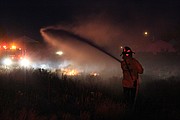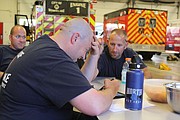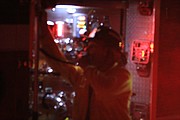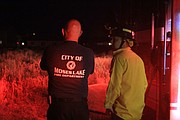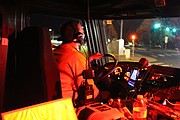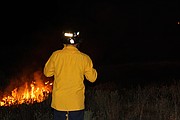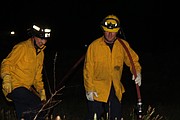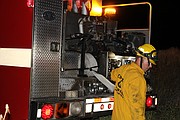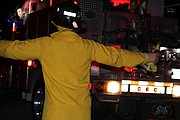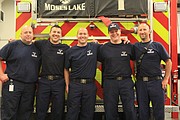A busy night with the Moses Lake Fire Department
Editor’s Note: In the evening hours on the Fourth of July Columbia Basin Herald reporter Emry Dinman had the unique opportunity to shadow personnel from the Moses Lake Fire Department. This story takes readers on an Independence Day journey with the men and women of the MLFD as they respond to calls and foster the genuine camaraderie that they share with one another.
5:30 p.m.
On Independence Day in Moses Lake, the city is in the capable hands of C Platoon, a ragtag team of firefighter paramedics. The night has yet to arrive, but already they have responded to one grass fire caused by fireworks. Maybe it’ll be the only one of the day. Since the city banned fireworks a number of years ago, the rate of Fourth of July fires has plummeted in Moses Lake.
Between calls, the scene is like any other family living room on this summer holiday: comfy chairs circle a mounted TV, a bowl of cheesy habanero chips lie just out of reach. They flip on “Iron Eagle,” shooting the breeze about classic movies and other roles the actors have played.
“He was in ‘Revenge of the Nerds,’” one says, pointing at Larry B. Scott, who plays in that movie as Lamar.
Barely a minute after pressing play, however, the first call goes out. Every phone in the room begins to buzz, and even as they’re reading the text alert “cardiac arrest,” they’re shuffling out of their recliners and speed-walking to the trucks. One team hits the ambulance, another into a firetruck to provide support.
The big bay doors go up, red lights flash, and the siren cries out.
5:45 p.m.
The inside of a firetruck is a lot like the rest of the job, a scene of controlled chaos. Tools, baubles, headsets and wires, though actually well secured, jangle and shake a good deal regardless.
The driver tries to navigate oncoming traffic, doing his best to make it to the incident as fast as possible while evaluating if the cars that aren’t completely stopping are just going to be annoying or are going to plow into the side of the engine. The passenger juggles pressing the button to activate the siren, supporting the driver in spotting if drivers are going to stop or pose a threat, and navigating, trying to find the best route to the scene and, if it’s a fire, trying to find the best angle of attack.
They arrive without incident at a quiet residential neighborhood, slapping on plastic gloves and rolling a gurney up through the front door. A family member waits gravely inside to describe what she saw, giving whatever pieces of information she might have in the hopes that it will help solve the puzzle of their loved one’s malady.
No one can plan for a medical emergency, and the messy relics of life being lived seem to stick out more for the crisis: the deflated kiddie pool, the banana boxes stacked on the front porch, the half-eaten meal the patient expected to finish. The sun bakes the ground all the same, the birds continue to sing, but suddenly the shadow of death stretched over an otherwise average day.
But no one is going to die today, at least not those in the care of the firefighter paramedics and their “paramagic,” as one puts it. The gurney is lifted with the patient on it into the back of the ambulance, and in a space barely larger than a broom closet, five men circle their patient and set about to save a life in another act of controlled chaos.
An EKG is hooked up and begins spitting out a printed spool depicting the man’s heartbeat, which is pumping twice as fast as a healthy person’s. The men ask questions, try to comfort a patient whose heart is leaping from his chest, and put him on an IV drip to give him fluids and a drug that will stop his heart and restart it a moment later.
For a moment, it doesn’t seem to have much effect, and the patient’s heart rate dips only slightly. Then, right when the paramedics are preparing for a Plan B, the patient’s heart stops, just for a second, and then restarts, beating normally. Much like unplugging and plugging in a computer, it fixes the immediate problem, and the patient can be safely transported to Samaritan Hospital.
6 p.m.
Tension rises and falls swiftly for a fire crew. Only moments after saving a man’s life, the men are back to shooting the breeze, occasionally making fun of each other in a brotherly way. There are a couple of ways to work the job, one of them notes, and not letting a call go once it’s over, no matter the outcome, isn’t sustainable.
Because they constantly deal with other people’s tragedy, sometimes even saving the same suicidal people over and over, and not always being able to save everyone every time, burnout is a real threat to the careers and well-being of the men and women of the Moses Lake Fire Department.
With 100 years of experience between the men of C Platoon, they’ve learned to de-stress in whatever ways they can. Sometimes talking isn’t enough, and the fire department can call for a critical stress debriefing. For every other time, C Platoon has each other.
6:20 p.m.
The men have returned for only a few minutes, pessimistically declining to even press play on “Iron Eagle,” when another call comes in. The men rush to their trucks, the bay doors go up, and away they go.
They speed off to another quiet neighborhood, parking in front of the patient’s house. The lawn is well mowed and a small American flag waves in the wind. There are steep concrete steps leading up to the door, and the men are careful in lowering the gurney, patient and all, down to where the engines sit.
Again in the ambulance, the men search for a pulse, check blood pressure, and ask questions. This patient doesn’t appear to be in critical condition, and they administer some anti-nausea medication and send him to the hospital. Back in the fire truck, one of them notes that the patient likely just needs to go visit the doctor and hasn’t due to affordability or some other factor. The firefighter paramedics aren’t doctors, but are often asked to stand in with those who can’t or won’t see a doctor until their condition deteriorates, they muse.
7 p.m.
The men of C Platoon always eat together, and the Fourth of July is no exception. A firefighter whips up some pulled pork, and the crew gathers around a kitchen table with plates of sliders, coleslaw and potato salad. As they eat, the group chats about their wives, about the weight they’ve gained or lost over the last few years, of the virtues and inanities of the Keto diet, and lightheartedly ragging on other shifts or fire stations.
One of them puts a full pot of coffee into the fridge. No matter what, there’s always a pot of coffee ready at the station, either for the department’s own men, or those passing by. When a Kittitas County Sheriff’s Deputy was recently killed and brought by the local fire department to Moses Lake for an autopsy, the crew was welcomed into the fire station and there was always coffee ready for them.
Once they finish eating, and not hoping to invoke any more bad luck by trying to start “Iron Eagle” up, the platoon’s captain pulls out a picnic bench, the men gather a few chairs, and they throw open a bay door facing Samaritan Hospital and the blue skies above.
8:10 p.m.
After a blessed reprieve and a chance to eat and digest their dinners, the phones buzz again, and loudspeakers pipe in the radio chatter: fire alarm at Walmart.
It’s the second such alarm that day, and even before getting into the truck, the captain predicts it will be a false alarm. Arriving at Walmart, the word comes in that store managers have canceled the call and the firefighters are free to go back to the station, but the captain instead goes in to inspect what caused the false alarm and reminds a store manager about properly maintaining their smoke detector.
8:50 p.m.
Back at the station and circling the picnic bench, the men of C Platoon watch as fireworks start going off over the hills around the hospital. They are, of course, within city limits and entirely illegal, but the firefighters aren’t law enforcement, and instead amuse themselves by seeing the improperly ignited fireworks exploding lower than they should and betting how long it’ll take before they have to go on a call in that neighborhood tonight.
From this vantage, they can clearly see a resident running around their front yard and setting off aerial fireworks, and one of the men playfully suggests that they roll up quietly in a fire engine before blasting on the P.A. system: “We see you!”
9:30 p.m.
The entire day up until this point is like any other for the fire department, but then, suddenly, the night switches gears. A call goes out about a grass fire in a residential neighborhood, and the men file into their trucks. The sun has set, and the overhead lights in the engines are dark red and gloomy.
Arriving at the incident, a young girl shouts to the firefighters, “At least we put it out!” The fire was minuscule to begin with, but as soon as they’ve verified that she has in fact put it out, another call goes out.
“Keep putting water on it for us, OK?” the captain shouts as they swivel to the next fire.
The next one is more sizable. About two acres of scrubland is burning, caught by a resident lighting fireworks in their backyard. A fire engine drives to either side of the blaze, keeping it from moving towards a nearby fence or the houses beyond. They haul heavy hoses across the patchy field, careful not to twist an ankle in the dark.
Scrubland fires are often as quick to put out as they are to ignite, however, and the firefighters make short work of it. In fact, cleaning up, winding up the hoses, and loading all the gear back into its proper place takes longer than tamping down the fire. After the fire is out, the platoon captain drives to the residence of the person who accidentally started the blaze, who, a few beers into their Fourth of July day celebrations, is clearly very embarrassed to have caused anyone any trouble.
The crew begins to head home when a third call goes out, again for a fire that springs up in a field behind someone’s home. The fire crew lets out a sigh and leaps again into action. It’s going to be a long night.
Friday morning
Though none of the incidents Thursday ended in catastrophe, almost all of them could have, were it not for the work of C Platoon. Though the fireworks-related incidents may have spiked Thursday, the Fourth of July was largely just another day in the life of a Moses Lake firefighter, who are always alert, always ready, and always keen to make a winking joke about each other’s rising cholesterol.
Though they may be jokesters, they’re also the people most likely to save a resident’s life or property in an emergency. They are the men and women of the Moses Lake Fire Department.
Emry Dinman can be reached via email at [email protected].












